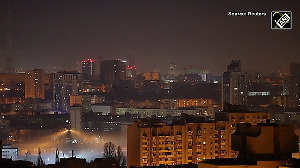President Dr A P J Abdul Kalam on Friday exuded confidence that India would become a permanent member of the United Nations Security Council.
Responding to a question at an interactive session with students at Hyderabad, the President said "we are a billion people, that is, one-sixth of the world's population. We have got the right to have membership of the UNSC. We will get it one day."
Kalam began his brief address by making the children recite his mantra: "Learning gives creativity; creativity leads to thinking; thinking provides knowledge; knowledge makes you great."
He ended the interaction by administering the 10-point oath wherein children vowed not to support any religious, caste or language differentiation but to be honest and endeavour to make a corruption-free society.
Paying tributes to Dr S Radhakrishnan, Mother Teresa, Dr Vikram Sarabhai, Dr Homi J Bhabha and Dr C Subramanyam, as well as Dr M S Swaminathan, the President said they were the men and women who inspired the nation with their vision in areas such as education, service to the poor, space, atomic energy and green revolution.
Out of a billion population of the country, youth constituted 560 million, indicating the great potential of the nation. The challenge, however, lay in uplifting the 26 percent of the people who lived below the poverty line.
Doubling the growth rate of the GSDP would require focusing on agro and food processing, education and healthcare, information and communication technology, infrastructure development and self-reliance in science and technology.
Referring to the unpredictability of natural disasters like earthquakes, Dr Kalam said "disasters are the special area I am working on. Many in the scientific community feel it is impossible to predict earthquakes. I was in Iceland recently. The island country is prone to earthquakes and volcanic eruptions. Through their experience over the years, they have developed a model for predicting these disasters. In Russia also, scientists believe that earthquakes can be forecast."
The President said literacy was a very important necessity for development and growth of the society. Recently when he went to Kerala, he found that the literacy being high in the state had resulted in high Human Development Index.
As per a recent survey conducted by Transparency International India, Kerala had been adjudged as the least corrupt state. Apart from the formal education, there was a need to imbibe good value system among the students. "If the good value systems are imbibed, the society is bound to be crime free," he observed.






 © 2025
© 2025